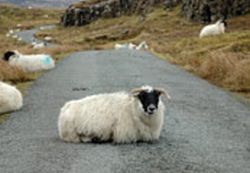
I get serious seasonal confusion disorder in December. Our household celebrates the Festival of Lights, better known as Hanukkah. My individual path takes me toward Christmas -- but I struggle for a clearer vision, stripped of the images of white people of the Middle Ages, more a sense of Jesus the Jew coming out of his wilderness experiences with fresh leadership. Yet the hill-walker that's my everyday self is most attuned to weather just now: snowstorms, wind, plunging numbers on the thermometer, glimpses of blue sky or bright moon or the wide shoulders of the constellation Orion. I count the days until the Solstice, need to notice the changes in daylight and darkness.
Hence it's a huge relief to be able to recommend the following, as poetry to seize for oneself, one's friends, one's dreams:
From the moment the first snow clouds hover over the landscape, Vermont winter is a season of longing: for tender snowfalls, for sparkling beauty, for the exhilaration of the cold, and also for comfort, warmth, protection, assurance. So it's a good season to read Kevin Goodan's first published collection of poetry, IN THE GHOST-HOUSE ACQUAINTED, which came out through Alice James in 2004. Goodan's second collection is on a publisher's desk; catch up now and be ready for the new book when it arrives.
The title poem opens, "I close the simple flowers / and bid the moon now rise / for Death is not my harbor." Walking through a quiet nighttime pasture, Goodan evokes the haunting and threat of the evening: "as frost presses down / with equal weight and terror." Shadows, moonlight, a sense of the earth at its beginning: "I remember that world / pouring into this."
Those well acquainted with West Coast Native American legends may recognize the ghost-house as an anchor of the Tsimshian world, though it's also a thread in Sioux explanations, and in another form in Cherokee language about the worlds of life and death. I find in Robert Frost a New England sense of ghost house, in the barren foundation of a house long uninhabited. It's fair to let all these threads braid while reading Goodan's work, for he draws from them in turn. Raised on the Flathead Indian Reservation in Montana as white stepchild in a strong family of Native American leaders, his spiritual vision mingles animism, the Lord, the land. Into the cradle of his childhood he pours his adult labors with animals, in the cruel winters of Montana and the damp chill ones of western Massachusetts, where he lives now.
This mingling of hauntings erupts in language like the close of his "Almanac of Caliber and Distance": "I want to build my house / in you, phantom in the song-light. // Starlings unsilence, / jay-crows gloss a bone-stack // and I will not close my eyes / to the flame held before me, // O fire -- of human / And not."
After this, the poems trek from llama raising (including the sorrowful weight of them when they die) to birds ("O, my soul is a hermit thrush"), to horses that crowd up against a fence and the ghostly vision of a white mare, summoned: ""In field, in bone / You white mare / In rain that peens a curved world flat -- ... Through every weather between us / Come O come you white mare," Goodan cries out.
Here are calls to a Lord, as well as sobs of frost and lambs and owls. By the time the collection wraps up, winter itself peals forth meaning and sustenance, even as the land groans under the ice.

No comments:
Post a Comment